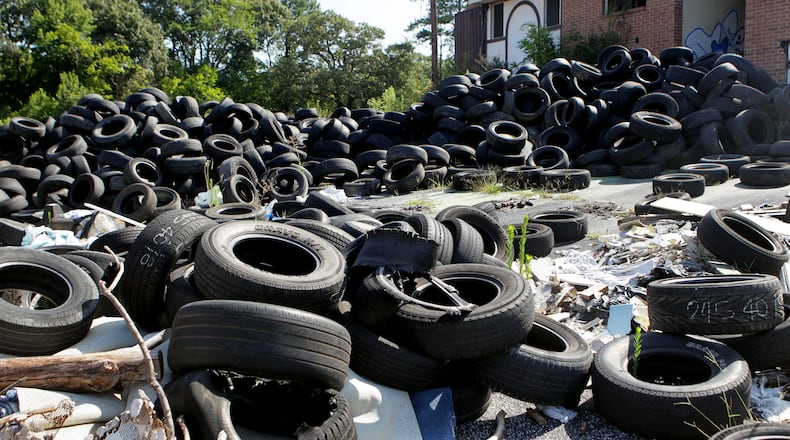The state disposal fees Georgians pay when they buy new tires and counties pay if they operate landfills will go down July 1, but the environmental cleanup programs those levies fund could see more money in the next year.
That’s because, under Gov. Brian Kemp’s budget proposal for the coming year, all the money raised by the new, lower fees will go into the Hazardous Waste and Solid Waste trust funds. Unlike in past years, none of it would be diverted.
Lawmakers created the funds almost 30 years ago to clean up tire dumps, landfills and hazardous waste sites, but they've diverted tens of millions of dollars raised by the fees for other purposes for more than a decade.
Under House Bill 220, which passed on the final day of the 2019 session, the $1 fee Georgians have paid on each replacement tire they buy will drop to 38 cents on July 1, and the solid waste disposal fee will be reduced from 75 cents per ton to 51 cents.
Consumers likely won’t notice the difference, but the fees will fund $11 million in environmental cleanup projects next fiscal year, which begins July 1.
Kathleen Bowen, a lobbyist for the Association County Commissioners of Georgia, said the state Environmental Protection Division has a long list of environmental cleanup projects the money could be used for.
“There are some counties that are tying to remediate their landfills, and those are big-ticket items,” she said. “They definitely have landfill projects that could use the funding.”
The ACCG said lawmakers have only appropriated all the fees collected once in the past 11 years, and that was for only one of the funds. Since 2009, about $150 million of the fee money has been diverted to the general fund, where it could go for anything from schools to marketing programs, public health care to local projects.
The General Assembly created the fees and funds in the early 1990s as a way to pay for environmental cleanups. Lawmakers told Georgians that’s where the money would go.
However, under state law, the General Assembly can’t formally dedicate fee money to specific causes without voters approving a constitutional amendment to do so. Once recessions hit in the early 2000s, governors and lawmakers began diverting the money away from environmental cleanup projects, using it instead to plug holes in the state budget.
So counties may not have gotten the money they needed to fix landfills or clean up tire dumps.
During Capitol budget hearings this week, Environmental Protection Division Director Richard Dunn smiled when asked by Sen. Larry Walker, R-Kathleen, where the money went.
“We collect the fee, we remit it to the treasury, and this body appropriates it,” Dunn said. “I don’t track where every dollar goes. I track the dollars we are appropriated.”
In Kemp’s proposed budget, funding for the Hazardous Waste Trust Fund would go from $4 million to $8.3 million. For the Solid Waste Trust Fund, it would go from $2.79 million to $2.81 million, even though the fees will decrease. Dunn said that’s because all the fee money would go to where lawmakers have long told Georgians it was supposed to go.
Environmental fund fees aren’t the only ones that have been diverted. Money for years was also diverted from funds meant to pay for driver education and law enforcement training.
County lobbyists, environmental groups and others have long pushed lawmakers to put a constitutional amendment on the ballot allowing the General Assembly to dedicate fees to funds such as the Hazardous Waste Trust Fund. That way it would be harder for a governor or General Assembly to divert the money.
Rep. Jay Powell, R-Camilla, a champion of the “truth-in-fees” legislation, died last fall, but county officials are hoping they can still get the proposed amendment on the ballot in November. The House and Senate passed different versions of the measure last session.
“We would consider it a win if those two funds were dedicated,” Bowen said.
Fees and funds
The state collects a scrap tire disposal fee when Georgians buy new tires for a Solid Waste Trust Fund and a landfill tipping fee for the Hazardous Waste Trust Fund. The General Assembly has diverted much of the money over the years to other programs. Below is a sampling of the fees collected and amount that went to the two environmental cleanup funds:
Fiscal 2009
$22 million collected
$1.97 million that went to funds
Fiscal 2011
$20 million collected
$4 million went to funds
Fiscal 2013
$17 million collected
$5 million went to funds
Fiscal 2015
$20 million raised
$9.7 million to funds
Fiscal 2017
$22.8 million
$6.8 million to funds
Fiscal 2019
$23 million raised
$6.8 million to the funds
Source: Association County Commissioners of Georgia
About the Author





